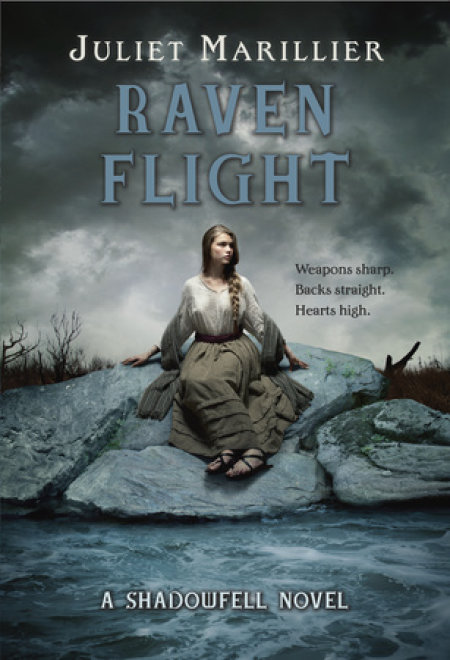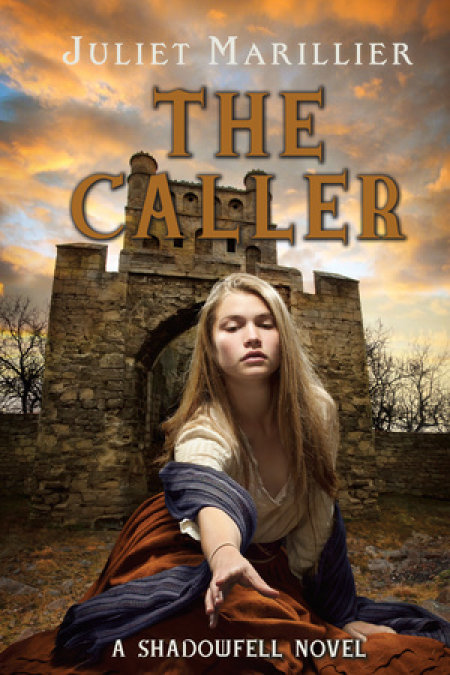Chapter One
As we came down to the shore of Darkwater, the wind sliced cold right to my bones. My heels stung with blisters. Dusk was falling, and my head was muzzy from the weariness of another long day’s walk. Birds cried out overhead, winging to nighttime roosts. They were as eager as I was to get out of the chill.
We’d heard there was a settlement not far along the loch shore, a place where we might perhaps buy shelter with our fast-shrinking store of coppers. I allowed myself to imagine a bed, a proper one with a straw mattress and a woolen coverlet. Oh, how my limbs ached for warmth and comfort! Foolish hope. The way things were in Alban, people didn’t open their doors to strangers. Especially not to disheveled vagrants, and that was what we had become. I was a fool to believe, even for a moment, that our money would buy us time by someone’s hearth fire and a real bed. Never mind that. A heap of old sacks in a net-mending shed or a pile of straw in a barn would do fine. Anyplace out of this wind. Anyplace out of sight.
I became aware of silence. Father’s endless mumbled recounting of past sorrows, a constant accompaniment to our day’s journey, had come to a halt, and now he stopped walking to gaze ahead. Between the water’s edge and the looming darkness of a steep wooded hillside, I could make out a cluster of dim lights.
“Darkwater settlement,” he said. “There are lights down by the jetty. The boat’s there!”
“What boat?” I was slow to understand, my mind dreaming of a fire, a bowl of porridge, a blanket. I did not hear the note in his voice, the one that meant trouble.
“Fowler’s boat. The chancy-boat, Neryn. What have we got left—how much?”
My heart plummeted. When this mood took him, setting the glitter of impossible hope in his eyes, there was no stopping him. I could not restrain him by force; he was too strong for me. And whatever I said, he would ignore it. But I had to try.
“Enough for two nights’ shelter and maybe a crust if we’re lucky, Father. There’s nothing to spare. Nothing until one of us gets some paid work, and you know how likely that is.”
“Give me the bag.”
“Father, no! These coppers are our safe place to sleep. They’re our shelter from the wind. Don’t you remember what happened last—”
“Don’t tell me what to do, daughter.” His eyes narrowed in a way that was all too familiar. “What’s better than a drink of ale to warm us up? Besides, I’ll double our coppers on the boat. Triple them. Nobody beats me in a game of chance. Would you doubt your father, girl?”
Doubt was hardly the word for what I felt. Yes, he had once been skilled in such games. He’d had a reputation as a tricky player, full of surprises. Sorrow and reversal, hardship and humiliation, had eaten up that clever fellow, leaving a pathetic shell, a man who liked his ale too much and could no longer distinguish between reality and wild dream. Father was a danger to himself. And he was a danger to me, for strong drink loosened his tongue, and a word out of place could reveal the gift I fought to hide from the world every moment of every day. He’d talk, and someone would tell the Enforcers, and it would all be over for the two of us. But I was heartsick and weary—too weary to fight him any longer.
“Here,” I said, handing over the bag. “I hate the chancy-boat. The only chance it will give you tonight is the chance to squander what little we have. If you lose this money, we’ll be sleeping out in the open, at the mercy of whoever happens to pass by. If you lose it, you’ll lose what little self-respect you have left. But you’re my father, and I can’t make your choices for you.”
He looked at me directly, just for a moment, and I thought I saw a glimmer of understanding in his eyes, but it was gone as quickly as it had appeared. “You hate me,” he muttered. “You despise your own father.”
I could have told him the truth: that I hated his weakness, that I hated his anger, that the days and months and years of looking after him and keeping him out of trouble and protecting him from himself had worn me down. But I loved him too. He was my father. I loved the man he used to be, and I still hadn’t given up hope that, someday, he could be that man again. “No, Father,” I said, plodding after him as he strode ahead, for the prospect of a game and a win had put new life in his step. “I’m cold and tired, that’s all. Too tired to mind my words.”
As we made our way closer to the lights of the chancy-boat, which rocked gently in the dark water beside a small jetty, I was aware of pale eyes watching me from the branches of the pines. I did not allow myself a glance toward them. Small feet shuffled in the fallen leaves and pattered along behind us a way, then skipped off into the woods. I did not allow myself to turn back. A whisper teased at me: Neryn! Neryn, we are here! I closed my ears to it. I had been hiding my secret for years, since Grandmother had explained the peril of canny gifts. I had become adept at concealment.
I stiffened my spine and gritted my teeth. Maybe there would be nobody on the chancy-boat but its captain, Fowler, who had some understanding of my father’s situation. Who would want to spend such a chilly night playing games anyway? Who would be visiting such an out-of-the-way place as Darkwater? We had come here because the settlement lay so far from well-traveled roads. We had come because nobody knew us in these parts. Except Fowler, and we had not expected him. But Fowler wouldn’t talk. He was a bird of passage, a loner.
We hope you are enjoying the book so far. To continue reading...
Copyright © 2026 All Rights Reserved


